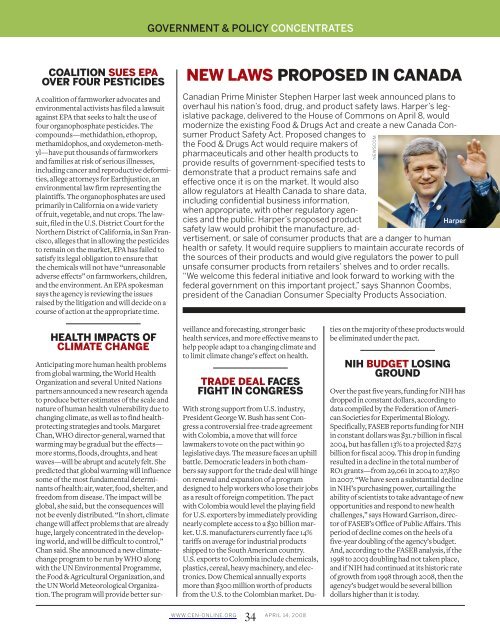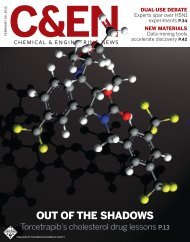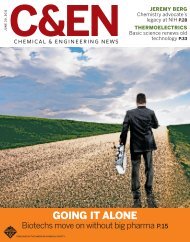Chemical & Engineering News Digital Edition - Institute of Materia ...
Chemical & Engineering News Digital Edition - Institute of Materia ...
Chemical & Engineering News Digital Edition - Institute of Materia ...
You also want an ePaper? Increase the reach of your titles
YUMPU automatically turns print PDFs into web optimized ePapers that Google loves.
COALITION SUES EPA<br />
OVER FOUR PESTICIDES<br />
A coalition <strong>of</strong> farmworker advocates and<br />
environmental activists has filed a lawsuit<br />
against EPA that seeks to halt the use <strong>of</strong><br />
four organophosphate pesticides. The<br />
compounds—methidathion, ethoprop,<br />
methamidophos, and oxydemeton-methyl—have<br />
put thousands <strong>of</strong> farmworkers<br />
and families at risk <strong>of</strong> serious illnesses,<br />
including cancer and reproductive deformities,<br />
allege attorneys for Earthjustice, an<br />
environmental law firm representing the<br />
plaintiffs. The organophosphates are used<br />
primarily in California on a wide variety<br />
<strong>of</strong> fruit, vegetable, and nut crops. The lawsuit,<br />
filed in the U.S. District Court for the<br />
Northern District <strong>of</strong> California, in San Francisco,<br />
alleges that in allowing the pesticides<br />
to remain on the market, EPA has failed to<br />
satisfy its legal obligation to ensure that<br />
the chemicals will not have “unreasonable<br />
adverse effects” on farmworkers, children,<br />
and the environment. An EPA spokesman<br />
says the agency is reviewing the issues<br />
raised by the litigation and will decide on a<br />
course <strong>of</strong> action at the appropriate time.<br />
HEALTH IMPACTS OF<br />
CLIMATE CHANGE<br />
Anticipating more human health problems<br />
from global warming, the World Health<br />
Organization and several United Nations<br />
partners announced a new research agenda<br />
to produce better estimates <strong>of</strong> the scale and<br />
nature <strong>of</strong> human health vulnerability due to<br />
changing climate, as well as to find healthprotecting<br />
strategies and tools. Margaret<br />
Chan, WHO director-general, warned that<br />
warming may be gradual but the effects—<br />
more storms, floods, droughts, and heat<br />
waves—will be abrupt and acutely felt. She<br />
predicted that global warming will influence<br />
some <strong>of</strong> the most fundamental determinants<br />
<strong>of</strong> health: air, water, food, shelter, and<br />
freedom from disease. The impact will be<br />
global, she said, but the consequences will<br />
not be evenly distributed. “In short, climate<br />
change will affect problems that are already<br />
huge, largely concentrated in the developing<br />
world, and will be difficult to control,”<br />
Chan said. She announced a new climatechange<br />
program to be run by WHO along<br />
with the UN Environmental Programme,<br />
the Food & Agricultural Organization, and<br />
the UN World Meteorological Organization.<br />
The program will provide better sur-<br />
GOVERNMENT & POLICY CONCENTRATES<br />
NEW LAWS PROPOSED IN CANADA<br />
Canadian Prime Minister Stephen Harper last week announced plans to<br />
overhaul his nation’s food, drug, and product safety laws. Harper’s legislative<br />
package, delivered to the House <strong>of</strong> Commons on April 8, would<br />
modernize the existing Food & Drugs Act and create a new Canada Consumer<br />
Product Safety Act. Proposed changes to<br />
the Food & Drugs Act would require makers <strong>of</strong><br />
pharmaceuticals and other health products to<br />
provide results <strong>of</strong> government-specified tests to<br />
demonstrate that a product remains safe and<br />
effective once it is on the market. It would also<br />
allow regulators at Health Canada to share data,<br />
including confidential business information,<br />
when appropriate, with other regulatory agencies<br />
and the public. Harper’s proposed product<br />
Harper<br />
safety law would prohibit the manufacture, advertisement,<br />
or sale <strong>of</strong> consumer products that are a danger to human<br />
health or safety. It would require suppliers to maintain accurate records <strong>of</strong><br />
the sources <strong>of</strong> their products and would give regulators the power to pull<br />
unsafe consumer products from retailers’ shelves and to order recalls.<br />
“We welcome this federal initiative and look forward to working with the<br />
federal government on this important project,” says Shannon Coombs,<br />
president <strong>of</strong> the Canadian Consumer Specialty Products Association.<br />
veillance and forecasting, stronger basic<br />
health services, and more effective means to<br />
help people adapt to a changing climate and<br />
to limit climate change’s effect on health.<br />
TRADE DEAL FACES<br />
FIGHT IN CONGRESS<br />
With strong support from U.S. industry,<br />
President George W. Bush has sent Congress<br />
a controversial free-trade agreement<br />
with Colombia, a move that will force<br />
lawmakers to vote on the pact within 90<br />
legislative days. The measure faces an uphill<br />
battle. Democratic leaders in both chambers<br />
say support for the trade deal will hinge<br />
on renewal and expansion <strong>of</strong> a program<br />
designed to help workers who lose their jobs<br />
as a result <strong>of</strong> foreign competition. The pact<br />
with Colombia would level the playing field<br />
for U.S. exporters by immediately providing<br />
nearly complete access to a $30 billion market.<br />
U.S. manufacturers currently face 14%<br />
tariffs on average for industrial products<br />
shipped to the South American country.<br />
U.S. exports to Colombia include chemicals,<br />
plastics, cereal, heavy machinery, and electronics.<br />
Dow <strong>Chemical</strong> annually exports<br />
more than $300 million worth <strong>of</strong> products<br />
from the U.S. to the Colombian market. Du-<br />
WWW.CEN-ONLINE.ORG 34 APRIL 14, 2008<br />
NEWSCOM<br />
ties on the majority <strong>of</strong> these products would<br />
be eliminated under the pact.<br />
NIH BUDGET LOSING<br />
GROUND<br />
Over the past five years, funding for NIH has<br />
dropped in constant dollars, according to<br />
data compiled by the Federation <strong>of</strong> American<br />
Societies for Experimental Biology.<br />
Specifically, FASEB reports funding for NIH<br />
in constant dollars was $31.7 billion in fiscal<br />
2004, but has fallen 13% to a projected $27.5<br />
billion for fiscal 2009. This drop in funding<br />
resulted in a decline in the total number <strong>of</strong><br />
RO1 grants—from 29,061 in 2004 to 27,850<br />
in 2007. “We have seen a substantial decline<br />
in NIH’s purchasing power, curtailing the<br />
ability <strong>of</strong> scientists to take advantage <strong>of</strong> new<br />
opportunities and respond to new health<br />
challenges,” says Howard Garrison, director<br />
<strong>of</strong> FASEB’s Office <strong>of</strong> Public Affairs. This<br />
period <strong>of</strong> decline comes on the heels <strong>of</strong> a<br />
five-year doubling <strong>of</strong> the agency’s budget.<br />
And, according to the FASEB analysis, if the<br />
1998 to 2003 doubling had not taken place,<br />
and if NIH had continued at its historic rate<br />
<strong>of</strong> growth from 1998 through 2008, then the<br />
agency’s budget would be several billion<br />
dollars higher than it is today.

















